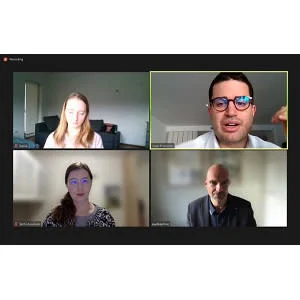On 9 December, the European Health Management Association (EHMA) held its second webinar on ‘Health Management: managing the present and shaping the future’. The session was moderated by EHMA Board President Dr Axel Kaehne, and EHMA Executive Director Mr George Valiotis, who also gave opening remarks. The webinar session, building upon the insights presented at the 2021 EMHA Conference in 15-17 September, addressed the topics of person-centredness & integration, improving healthcare access and outcomes, and sustainability.
Dr João Frutuoso, clinical practice and Union delegate from the Hospital Vila Franca de Xira in Portugal, discussed improving access and outcomes to healthcare. Ms Terhi Helena Auvien, Researcher at the Department of Health and Social Management, University of Eastern Finland, discussed person-centredness and care integration. Ms Kasia Skoczek, a student at the Department of Nursing and Health, University of Applied Science Fulda in Germany, discussed sustainability.
Common themes bought up by the three speakers included person ‘patient’ centricity and healthcare staff burnout. The COVID-19 pandemic exacerbated these issues, but intelligent technology integration and better health management can help. All three speakers emphasised the benefits of healthcare digitalisation.
The 2021 EMHA Conference previously offered the following insights concerning:
Healthcare Access and Outcomes: Ironically, healthcare funding is inversely proportionally to treatable and preventable deaths per 100,000 inhabitants. Differences between observed and expected mortality are high in North America and Eastern Europe, and comparatively low in Western Europe. To optimise funding choices and increase healthcare value, identifying and analysing trade-offs between costs and benefits are necessary. Using real-world data, mechanisms to measure imparted value can guide funding allocation during annual budgeting.
Dr Frutuoso, during the webinar, offered the following advice: Healthcare digitalisation improves networking between stakeholders. Using proximity programs to ensure healthcare continuity between hospital and community providers.
Person-Centredness: This holistic healthcare approach focuses on the patient in the care planning. Patient-centred thinking improves the patient experience, and in turn, efficiency, effectiveness and quality for the patient. Better care coordination is achieved by standardised processes and communication between health professionals. Care transitions, accounting for patients’ and the family’s individual needs, empower and support the patient and the caregiver during the transition. Patient journey mapping informs and shifts from organisational logic to the patient’s perspective.
Ms Auvien added that digitalisation could strengthen healthcare systems to be become more resilient and perform better during crises like COVID-19, but its implementation should be patient-centred.
Sustainability: To promote sustainable healthcare and make strategic interventions, all system activities should be evaluated instead of just carbon footprints. In turn, this promotes greater organisational efficiency and effectiveness. Interprofessional collaborations are essential. Good communication can help reduce pharmaceutical waste. Digitalisation can reduce the healthcare impact on the environment.
Ms Skoczek added that social sustainability should incorporate gender medicine, weighing in biological, social, cultural, economic, and environmental variables in determining health status. In turn, this improves economic resources allocation, and consequently, financial sustainability.
Source: EHMA Conference Report, EHMA Webinar









